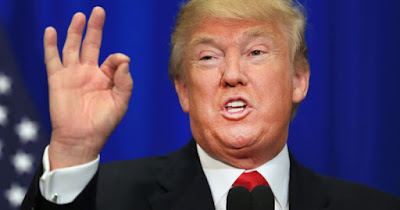Trump, Henry I and Dominoes: third parties in bilateral diplomacy
This week Donald Trump, the giver of diplomatic faux-pas who
won’t stop giving (despite the rest of world literally begging him to stop),
recognised Jerusalem as Israel’s capital and promised to move the US embassy to
the city from Tel Aviv.
Whilst there has been much speculation over Trump’s 'foreign
policy’ (read in a sarcastic voice), one of the upshots of this action is
clear: improved relations with Israel. Israeli Prime Minister Benjamin Netanyahu claims Trump has been ‘courageous and just’ and ‘inscribed himself in the
annals of our capital for all time’.
 |
| Move over big guy, there's a new man in town ... |
Netanyahu’s response to this bilateral action is to be
expected. By moving the US embassy to Jerusalem Trump is recognising Israel’s
controversial annexation of East Jerusalem during the Six Day War (Evidence of
modern people’s declining attention spans. In the medieval period people used
to pay attention long enough to keep wars going for a hundred years).
However, non-Israelis have been far less enthusiastic. As
expected the Palestinians, who claim East Jerusalem as their capital, have been
incredibly vocal. Palestinian President Mahmoud Abbas branded Trump’s actions
as ‘deplorable and unacceptable measures deliberately undermine all peace
efforts’.
More interesting though is the breadth of the international
condemnation. Important members of the Muslim world have opposed the move. For example, King Salman of
Saudi Arabia warned Trump his policy ‘would constitute a flagrant provocation
of Muslims, all over the world’. Likewise, Western European leaders have
criticised his approach, with French President Emmanuel Macron calling it ‘regrettable’
and Theresa May (who, following his twitter spat with her last week, Trump probably now
refers to as ‘a hater’) arguing it is ‘unhelpful in terms of prospects for peace in the region’.
 |
| Kissinger and Machiavelli failed to consider ‘Shake it off’ ‘s diplomatic implications |
Even the Pope jumped on the incredibly busy ‘Anti-Trump Train’, admitting that he cannot silence his ‘deep concern over the situation that has emerged in recent days’.
An intriguing comparison is Henry I of England’s diplomatic interactions with Anjou in the early twelfth century. Much like Trump, Henry I was embroiled in foreign policy issues. In 1106 Henry I defeated his brother Robert Curthrose at the Battle of Tinchebray and usurped Robert’s claim to Normandy. The possession of continental land frequently entangled Henry I in European disputes and conflicts, particularly with Louis the Fat of France (I promise I have not made that name up).
 |
| Sadly body shaming was common in the medieval period |
Henry I’s solution seems to have been to improve relations with continental rulers, thus stabilising his position in the region. For example, in 1119 he married his son William Adelin to Fulk V of Anjou’s daughter Matilda.
However, the impact of this bond was felt beyond Henry I and Fulk V. Suger, Louis the Fat’s contemporary biographer describes how, by allying himself with Henry I, Fulk V had gone from being ‘allied to King Louis’ to a man who ‘put greed before fealty and … falsely betrayed his sworn word’. Clearly, Suger felt Fulk V’s friendship with Henry I was a betrayal which destroyed his bond with the French king.
Like Trump’s decision to move the US embassy to Jerusalem, Fulk V's relations with Henry I show that diplomacy between two parties influences those parties’ relations with other nations. This has penetrated all diplomatic encounters throughout history. When, US President Richard Nixon met Soviet Premier Leonid Brezhnev to discuss arms control, were their allies not interested to see if their views were represented? Was the world as a whole not concerned about the danger of an indefinite nuclear arms race? Therefore, bilateral diplomacy does not exist. Rather, as Trump and Henry I indicate, when two nations interact the decisions and policies they pursue reverberate across the international spectrum.
 |
If this was a newspaper in the 1930’s I would have drawn a satirical cartoon of Trump knocking over the first in a line of dominoes with the final one labelled ‘nuclear war’. As I am rubbish at drawing, here instead is a picture of Trump on The Fresh Prince of Bel-Air, as a reminder that all good things have drawbacks.
Bibliography
Primary:
Anglo-Saxon Chronicle, Douglas D C, Greenaway G W (eds.), English Historical Documents II (London, 1953)
Suger's The Deeds of Louis the Fat, Cusimano R, Moorhead J (eds.), (Washington: DC, 1992)
Secondary:
Diggelmann L, 'Marriage, Peace, and Enmity in the Twelfth Century', Common Knowledge, 22 (2016)
'Jerusalem is Israel's capital, says Donald Trump', 6 December 2017, BBC News. http://www.bbc.co.uk/news/world-us-canada-42259443 . Accessed 8 December 2017
'Jerusalem: Trump move prompts negative world reaction', 7 December 2017, BBC News. http://www.bbc.co.uk/news/world-middle-east-42250340 . Accessed 8 December 2017
|



Comments
Post a Comment